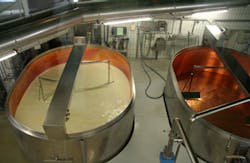The U.S. Food and Drug Administration (FDA) issued a warning letter to Gioia Cheese Company, Inc., headquartered in South El Monte, Calif., after inspectors tested samples from its production facility and found they were contaminated with listeria.
In the letter, addressed to the company's president and owner, Vito Girardi, the FDA stated that during the inspection at the processing facility, which took place between Aug. 22 and Aug. 29, a number of environmental samples were taken from various areas at the plant, as well as ricotta cheese product samples. The results found the presence of the human pathogen of listeria monocytogenes, collected from the wheels and the side of a mozzarella holding table, underneath a drain grate and a floor mat near the packing table.
In addition, FDA inspectors also noticed a series of violations of the Current Good Manufacturing Practice (CGMP) regulation for food, including failure to handle work-in-progress in a way to effectively prevent contamination. Inspectors found that equipment, containers and utensils used to hold or store food were not properly handled to ensure they were protected from being contaminated. Last, but not least, the FDA noted that the company has not adequately installed and maintained plumbing so that it is not a source of contamination. These violations, combined with the presence of the listeria pathogen, have led to a substandard production of the ready-to-consume cheese, as the products were prepared, packed and stored under insanitary conditions and may be a risk to human health.
RELATED: Food processing companies face stricter regulations under Food Modernization Act
The inspection in August 2012 was not the first time listeria monocytogenes had been detected at the company's facility. The pathogen was found at the plant on two previous occasions, in July 2010, when two environmental swabs tested positive, and later in February 2011, when listeria was found in five environmental swabs, the letter pointed out. On the first occasion, the contamination was found on the floor around the drain underneath the brine tank and the floor around the wheel of the brine tank. In 2011, listeria was detected on the floor underneath one of the soak tanks, under the weighing table and underneath the floor mat under it, the surface of the floor drain underneath the brine tank and on a plastic bucket in the main processing room.
The FDA noted that the environmental swabs collected in all three inspections were "indistinguishable," suggesting that the conditions in which the cheese is prepared have not changed significantly and the safety breaches have not been fixed in the long term. Inspectors believe that the presence of the same pathogens in the facility means that listeria monocytogenes may have spread across the facility and may have found niches to colonize.
Regulators have warned Gioia Cheese that the measures it has been implementing to improve sanitation have been inadequate and the company cannot control the contamination of food. The FDA recommended that the company reconsider its sanitation control to include effective environmental monitoring programs that are able to identify and eliminate pathogens that could contaminate food products.
